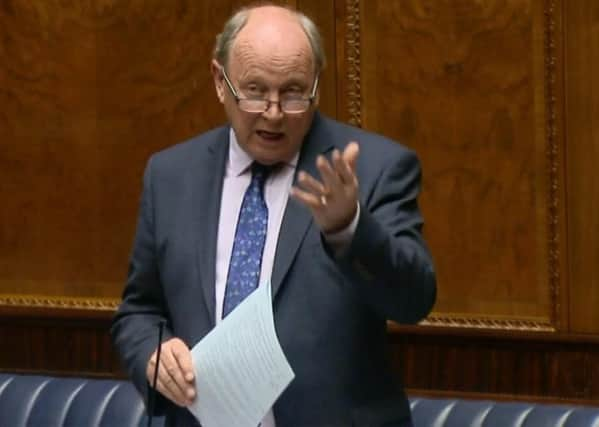Allister defends farming against Climate Bill ‘madness’


In the course of his remarks the North Antrim MLA said: “The proposer of the motion managed to make a speech, and, unless I missed it, did not once mention agriculture, yet agriculture is the very foundation of our economy.
“Someone said in the debate that the Bill does not set targets for agriculture. I am sorry, but agri-food is identified in clause 3(6)(i) and clause 3(7)(h) on sectoral plans. Sectoral plans inevitably will include targets, so the Bill anticipates setting sectoral plans with targets for our agri-food industry.
Advertisement
Advertisement
“We have all had many lobby letters on this subject - rightly so - but probably the one that encapsulated for me the threat came from the Northern Ireland Grain Trade Association. Let me read a couple of paragraphs from it because I have not heard them countered in this debate:
“The private Member’s Bill proposed by the Green Party will be devastating to the agri-food sector. It will reduce the value of the livestock sector by more than 50% — taking around £1 billion per annum out of the rural economy, leading to rural depopulation and a major loss of export earnings. There will be a loss of up to 50,000 jobs in the processing and supply industries which will devastate the NI economy ...
“The private Member’s Bill currently proposed is ill-considered and irresponsible. It ignores the UK Climate Change Committee’s advice which recognises the much greater importance of agriculture in Northern Ireland and that much of the food produced here is consumed in Great Britain.
“It also flies in the face of the excellent work carried out by our expert scientists and researchers in DAERA and AFBI and the reality is that the measures will contribute nothing to the global environment or to the challenge of feeding a growing population.
Advertisement
Advertisement
“The inevitable outcome of this policy is that the UK requirement for meat and dairy will simply be imported from regions where emissions are higher, and animal health and welfare standards are much lower than in Northern Ireland,” continued Mr Allister.
“That sounds pretty irrefutable. I have heard no one in the debate refute it: no one.”
Mr Allister went on to directly challenge the contradictory contributions of some supporters of the Bill: “People have spoken out of both sides of their mouth in the debate. They have said, “Oh, we’re going to look after the farming sector. We’re going to consult. We’re going to make sure that these things don’t happen”. It is clear what will happen if the Bill is enacted. You cannot proclaim, for the sake of your constituency, that you will protect your farming community if you troop through a Lobby tonight to vote for something that will devastate your farming community. That is the reality that we face in the debate.
“I remind the House of a point that I made in an intervention: the targets set cannot be reduced. We are told, “Oh, things can be reviewed” and, “We can look at things as we go along”. There are some things that you cannot look at. Clause 11(2) is clear:
Advertisement
Advertisement
“the Executive Office must not propose any alteration which has the effect, whether directly or indirectly, of lowering any target under section 3(2) ... from the level approved by the Assembly under section 2(3) ... when the corresponding climate action plan was so approved.’
“There is no second chance under the Bill to rescue a sector that you will so wantonly devastate. You cannot reduce the targets.”
Summing up his opposition, Mr Allister said: “I am saying that the answer is not to take 50% of our animals and slaughter them or to take 50% of our production and export it to the depleting rainforests of Brazil and then sit back smugly and say, “Didn’t we do well?”. That is the ethos of the Bill. People, much as Mr Wells might not like it, will continue to buy meat.
“Do they buy the meat produced in north Antrim or the meat produced on land that has been stripped in the Amazon basin? That is an issue that politicians in the Western world have to consider. Therefore, I say to the House that the Bill is, as the Northern Ireland Grain Trade Association, I think, described it, ill considered.”